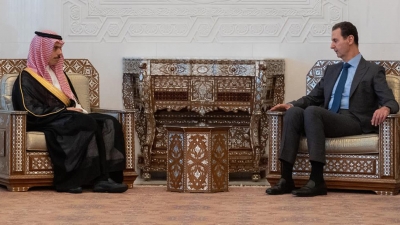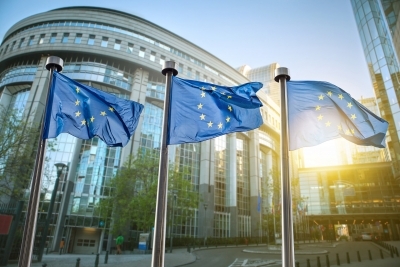Executive Summary
This report provides an overview of the key events in Syria during April, focusing on political, security, and economic developments. One significant political event was the Arab rapprochement with the Assad regime, highlighted by the visit of the Saudi Foreign Minister to Damascus. This visit marked the end of a decade-long official boycott and was accompanied by the exchange of ambassadors between Damascus and Tunisia, as well as the reception of Assad's foreign minister in Egypt and Algeria. Despite these political developments, the shortage of essential goods and high prices remained major problems for the Syrian population. This issue was particularly pronounced during the month of Ramadan and Eid al-Fitr, with prices rising by 100% compared to the previous year. On the security front, there were no significant changes in the Syrian arena. Israeli airstrikes continued to target military and security sites associated with Iranian militias. Additionally, Ankara announced the killing of an ISIS leader.
Arab rapprochement with the Regime: “Swift Progress”
During April, the Syrian political scene revolved around the Arab rapprochement with the Assad regime. This included significant developments such as:
- Tunisia reopening its embassy in Damascus.
- The regime's Foreign Minister, Faisal Miqdad, visiting Egypt and Algeria.
- The Saudi foreign minister's visit to Damascus after a decade-long official boycott.
These visits were part of an Arab diplomatic effort led by Saudi Arabia, Jordan, and the United Arab Emirates to engage with the Assad regime. This engagement came with various Arab demands, including political reforms and the establishment of a safe environment for the return of refugees, but at the same time it became clear, that the Arab rapprochement with the Assad regime lacked a clear roadmap for achieving desired outcomes. The path of reconciliation with Turkey also faced obstacles as the regime insisted on the withdrawal of Turkish forces from Syrian territory as a condition for restoring relations. Ankara, however, refused to include this condition in the current agenda.Meanwhile, key figures within the Opposition maintained their opposition to normalizing relations with Assad. They held meetings with European ambassadors and envoys in Qatar, capitalizing on the Western discourse that emphasizes non-normalization until UN resolutions are implemented.The "Autonomous Administration" focused on sending messages to regional countries aligned with the Assad regime. These messages aim to showcase the administration's ability, as a local Syrian entity, to play influential roles in areas of common interest, such as counterterrorism, preventing drug exports, and facilitating the return of refugees. The messages include the following key points:
- Launching the "Peaceful Resolution to the Syrian Crisis" initiative, urging the "Damascus government" to take urgent actions to expedite a solution.
- The readiness of the forces of the Autonomous Administration to join the Syrian army, as stated by SDF commander Mazloum Abdi.
- The announcement of the Autonomous Administration's preparedness to receive Syrian refugees from Lebanon in coordination with the UN and the EU.
Security incidents: “Limited Impact”
In April, Israel kept on targeting locations with Iranian influence and control. These strikes focused on security and military sites in various regions, including Damascus and its surrounding, al-Suwayda, Daraa, Quneitra, and Homs.Meanwhile, the International Coalition assassinated a prominent ISIS leader, Khaled Eid Ahmed al-Jubouri in Idlib, al-Jabouri is from Iraq, and responsible for planning terrorist attacks in Europe. Turkish intelligence also reported the assassination of another ISIS leader, Abu al-Hussein al-Husseini al-Qurashi, in a military operation conducted in northwestern Syria.Daraa witnessed a series of assassinations resulting in the loss of 32 lives, with an additional 17 individuals losing their lives in separate security incidents. This highlights the ongoing state of security chaos that the Assad regime and its allies have been unable to resolve.
Shortage of basic materials and high prices
In the Regime-controlled areas issue of escalating commodities prices continued to burden the Syrian population, particularly during the month of Ramadan and Eid al-Fitr. Prices surged by 100% compared to the previous year's Ramadan. The situation was compounded by the Syrian pound's depreciation, reaching a rate of 8,250 SYP against the dollar, while the Central Bank's ability to intervene in the market declined. In April, the regime government implemented several decisions, including:
- Increasing prices and fees for transporting materials and goods via trucks.
- The Telecommunications and Post Regulatory Authority (TPRA) raised the fares for cellular services by 30% to 35%, and fixed telecommunications services by 35% to 50%.
- The regime's government set the purchase price of wheat at 2,300 SYP per kilo of wheat. However, the production cost is around 2,050 SYP, resulting in a narrow profit margin of only 150 SYP per kilo for farmers.
The depreciation of the Syrian pound in Autonomous Administration-controlled areas has had repercussions across various sectors. In the electricity sector, generator owners raised the prices of amperes to 8,000 SYP, even though the municipalities of Qamishli and al-Haskalah had set the price at 7,000 SYP per ampere. Additionally, the region is still experiencing a shortage of sugar, which led to a price increase. During this month, the Administration, under Russian supervision, reached an agreement with the regime concerning "drinking water and electricity." As per the agreement, the regime will supply the city of Manbij and its surrounding areas with drinking water from the Babiri station in Khafsa. In return, the Autonomous Administration will provide the regime with 30 megawatts of electricity per day from the Tishreen and Tabqa Dam, along with 50 oil tanks per day. In Opposition-controlled areas, the local council in the city of Azaz demanded a reduction in the price of kilowatts from the electricity company AK ENERGY. The company responded by reducing the value of electricity subscriptions starting from April 10. However, despite this adjustment, people and local councils continued to express their dissatisfaction as the new price remained high and not in line with living conditions. Regarding recovery projects in the region, the Trust Fund for the Reconstruction of Syria announced the delivery of 400 tons of fertilizer to two thousand vegetable farms and 850 tons of fertilizer to two thousand wheat farms.
Regional efforts to mitigate Feb-6 earthquake damage
The Qatar Fund for Development has announced an agreement with the Turkish Presidency of Disaster and Emergency Management (AFAD) to support the establishment of an integrated city in northern Syria. This city aims to accommodate 70,000 people. Additionally, the Qatar Development Organization and the United States Agency for International Development have signed a funding agreement to support the Syrian Civil Defense Organization's essential operations. The "salvation" government in Idlib has reduced the price of domestic gas cylinders by 90 cents (around 17 Turkish liras), bringing it down from $13.5 to $12.6. Idlib National Hospital is also planning to distribute free medicines intended for cancer patients. The conditions for cancer patients in northwestern Syria have worsened as Turkish hospitals stopped receiving them after the earthquake disaster on February 6. The Syrian Response Coordinators/ منسقو استجابة سوريةteam has issued the final report on the damage caused by the February 6 earthquake in Syria and Turkey. The report reveals that:
- Over 1.8 million people were affected in northwestern Syria, with 4,256 civilian casualties, around 12,000 injured, and 67 individuals still missing.
- The number of displaced people has reached 300,000, with more than 65% of them being children, women, and individuals with special needs.
- Economic losses from the earthquake are estimated at $1.95 billion, including damage to public and private sectors and other facilities.
- The earthquake also caused significant damage to educational institutions (433 schools), medical facilities (73), and housing units (136).




